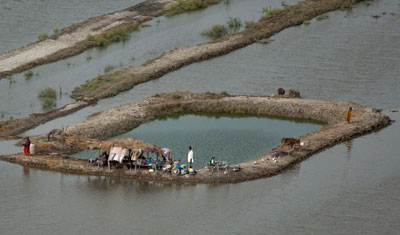As most of the nation lay paralyzed and submerged in flood water, Pakistani journalists traveled in four-wheel drives and rickety boats to bring tidings from some of the hardest hit areas of the country. The Pakistani Federal Union of Journalists (PFUJ) compiled a list of journalists directly affected by the flood, many of whom had had their homes washed away, while journalists who were still on their feet faced a host of other challenges.
Last week, I spoke with three of them: Hasan Abdullah, a Dawn TV reporter based in Karachi; Imran Khan, an Al-Jazeera correspondent who covered the floods in Sindh province; and Azhar Abbas, the managing director of Geo TV, who ran the network’s nationwide flood coverage.
“Gaining access to some of the affected areas can be quite a challenge, especially in interior Sindh,” Abdullah, the Dawn TV reporter, told me. “Because of tribal disputes in these areas, if you’re seen with a camera you can land yourself in trouble. Another issue is cultural sensitivity, if they feel you may be filming women. This had led to shots being fired at journalists.”
He added that most residents, especially those with families, are desperate for any kind of aid. “Their priority is to get help,” Abdullah said. “The vast majority appreciate what you’re doing.”
Most roads and highways were severely damaged in the floods, making it hard for journalists to reach remote areas. Some reporters have been handling the problem of transportation by embedding with military rescue teams.
Abbas, the Geo TV managing director, said his network had benefited from both army and government cooperation. “There were certain areas that were very difficult to go to, and the army, navy and air force really helped us out,” he explained. “I haven’t heard any areas where there are certain restrictions either by the government or the armed forces as far as coverage is concerned.”
But Abdullah of Dawn TV was a bit more tentative. “Traveling with the army puts immense pressures on you,” he told me. “They expect you to follow their pattern of reporting – what should be said and what should be covered up. The only time I’m willing to travel with the army is if I want to get some good aerial shots.”
Journalists have been able to move around the country without interference from local authorities, which are absent in the wake of the floods.
As Abdullah put it, “What I witnessed when traveling to these areas was not a case of mismanagement, but a complete absence of any management.”
Even the Pakistani government’s efforts to restrict mobility have been ineffectual. Speaking with Khan, the Al-Jazeera correspondent, I learned that government officials had sent out a note prohibiting access to interior Sindh.
“We traveled to those areas anyway,” Khan told me. “There was simply no government presence at all. That’s what shocked me most. Usually, as a journalist, you reach a natural disaster zone at the same time as or in some cases slightly after the emergency services or aid agencies. But I was among the first people to arrive.”
Arriving first can underscore the human tragedy of the floods, because victims often mistake journalists for aid workers.
“You go in with a camera, so when people see an outsider for the first time, they immediately think you’ve come to offer them help. But you don’t have any aid, you don’t have any medical supplies – you don’t have anything,” Khan said.
The three Pakistani journalists disagreed on how well their government has coped with the crisis.
Abdullah said the response has been a “disaster,” at least from the civil administration’s side.
Khan was also critical. “The government just made mistakes, like [President] Zardari going to Europe, or [Prime Minister]Yusuf Raza Gilani going, allegedly, to a fake hospital which was set up for him to visit, and not asking for more help more quickly,” he said. “There was no acknowledgment of the scale of disaster. We knew it as journalists, the aid workers knew it, the diplomats from foreign countries knew it, but there seemed to be reluctance for the Pakistanis to admit it.”
Abbas disagreed with them. “To be perfectly honest, it’s very unfair to say that the government is not doing enough. Yes, I would say that they were a bit slow to respond, but because of media criticism they have increased their presence,” he said. “Frankly, the scale of the disaster is so huge that no government in the world could probably manage it.”
And the humanitarian crisis continues. With the European Union’s recent decision to send undocumented Pakistani nationals back home less than two months after the floods, the country’s problems are only getting worse. For the immediate future, Pakistani journalists will have little uplifting news to report.
